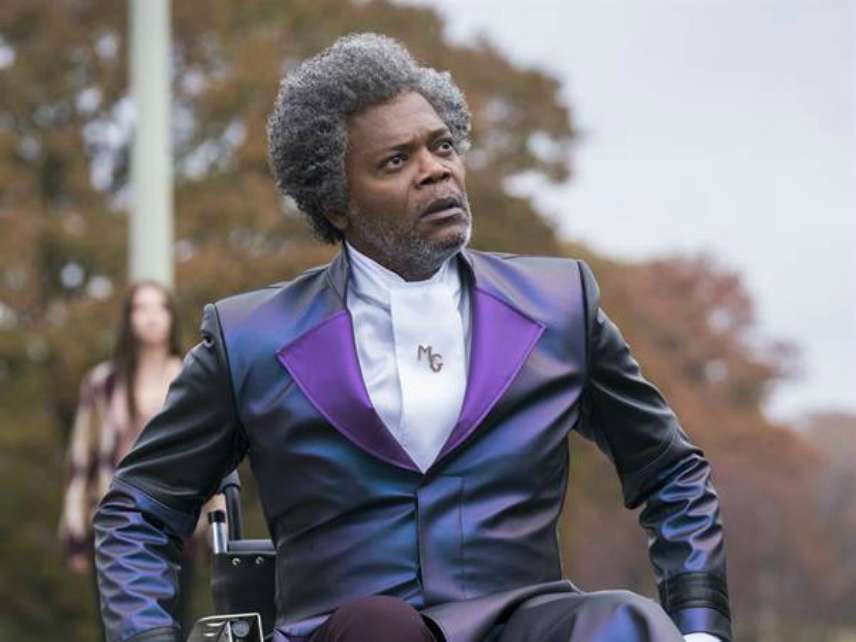Movie Review: Glass
M. Night Shyamalan ends his makeshift superhero trilogy with a dull thud.

Unusually for an M. Night Shyamalan project, the real plot twist in Glass comes not at the end of the movie but about halfway through, when you realize it won't be getting any better and is in fact getting worse by the minute.
The possibility of a sequel to Shyamalan's Unbreakable has been tantalizing fans for nearly 20 years. Unfortunately, the director always felt he had better things to do. (If only he had done them, instead of making the wretched Lady in the Water and After Earth.) Then, two years ago, at the conclusion of Split, the psycho-thriller that brought him back to the box-office bigtime, Shayamalan tacked on a tiny scene that featured Unbreakable protagonist David Dunn (Bruce Willis) making ominous mention of that earlier movie's villain, Mr. Glass, who had been played by Samuel L. Jackson.
And so here we are, back in Shyamalan's beloved Philadelphia, where Split's multiple maniac Kevin Wendell Crumb (James McAvoy) is still on the loose and has just abducted a gaggle of teenage cheerleaders, whom he's got shackled up in a warehouse. But Dunn is on to him. Nowadays the glum super-guy runs a security-gear store with his son Joseph (Spencer Treat Clark, who played the same role on a smaller scale in Unbreakable). On the side, though, David is still in the business of dispensing vigilante justice to creeps in need. He is in the process of doing this to the wacko Crumb and his 23 other personalities when the cops arrive and haul all of them off to the Raven Hill mental hospital—longtime home-away-from-home of the fragile-boned evil mastermind Elijah Price, a.k.a. Mr. Glass.
Sound like a promising setup? Lock that thought away somewhere and dispose of the key. No sooner are we getting sort of interested in the story than an annoying psychiatrist named Dr. Ellie Staple (Sarah Paulson) shows up to deliver incredibly boring lectures to the three celebrity inmates. Staple argues at interminable length that comic books aren't real life (nobody argues back) and says that Dunn, Glass and Crumb must stop believing that they are superbeings and instead accept the fact that they are simply delusional. She also informs the boys that she has only three days to accomplish her mission (which sounds a little suspicious, frankly).
One problem with this scenario is that the hospital keeps Glass heavily medicated (to befog his awesome cognitive abilities) and so Jackson spends the first half of the movie slumped wordlessly in a wheelchair. Another is that Willis is given little to do and seems barely engaged with the movie in any case. That leaves the nutjob field to McAvoy's Kevin (or Patricia, or Hedwig, or Dennis, or whichever of his resident loons is in charge at the moment—pray that it's not the bloodthirsty Beast). Now, there's no arguing that McAvoy's ability to manifest one after another of these alternate personalities—a middle-aged woman, a nine-year-old boy, a campy artist with a Boston drawl—isn't technically impressive. But it also grows really monotonous, especially after the scene in which several of these identities are triggered in very quick succession by flashing strobe lights.
Given his many problems, you wouldn't figure Kevin for a chick magnet. But then you don't know Casey Cooke (Anya Taylor-Joy), whom The Beast almost killed in Split, after successfully murdering two of her friends. The reason Casey was allowed to survive at that time was that Kevin/Beast realized, at the last minute, that she, like him, had been abused as a child. Okay, it's complicated. But now Casey is back for a reunion with Kevin and company (or "The Horde," as his many identities are called). She even holds hands with her former assailant as Dr. Staple looks on. I believe this is a healthcare crisis we can all agree to deplore.
Before long—well actually it seems like a very long time, but eventually, Mr. Glass snaps back to life, once again resplendent in his shiny purple greatcoat, with a snazzy new "MG" pin wittily affixed to his cravat. Mastermind that he is, Glass has come up with an escape plan to get him out of the hospital, with a little help from The Beast. (Around in here we're also told quite a bit about a new skyscraper that's being inaugurated in Philadelphia, but that turns out to have nothing to do with anything, so pay it no mind.) Meanwhile, David Dunn has retrieved his own professional costume—the capacious green rain poncho associated with his aquaphobic alter ego, now known as The Overseer—and is ready to do super-battle with The Beast and the scheming Glass. This leads into one of the worst-staged fights in the history of major-studio conflict—a sequence in which three guys basically stand around in a parking lot and there's also a water tank.
There is of course a traditional Shyamalanian twist at the end of this movie, and it's a good one. In fact, it's the best thing in the picture, pointing the way toward a very cool mutation of the story. It's a movie just waiting to be made, in other words—although maybe not by M. Night Shyamalan.

Show Comments (39)